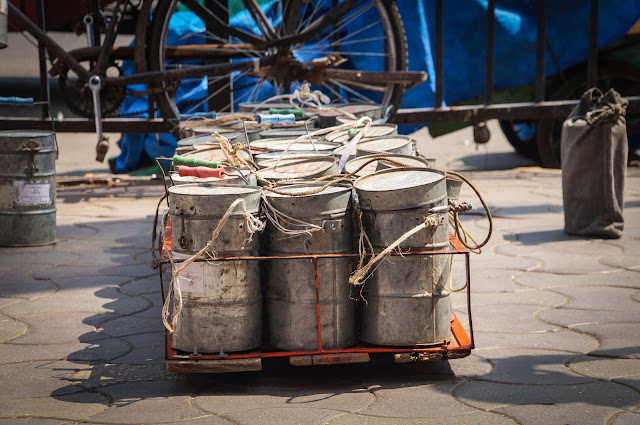It was 10:30am and already the air was a thick urban stew of sweat, exhaust, and the smell of stuff being fried in Mumbai’s ubiquitous food stalls. Zach and I were huddled in a foot-wide slice of shade, sipping tiny cups of 5 rupee chai. We had strategically positioned ourselves at a corner, where two exits from Churchgate Station opened out onto the sidewalk. Though it was well past rush hour, a steady stream of commuters hurried in and out of the station and trains pulled in and unloaded every few minutes.
“There’s one!” shouted Zach, pointing over the heads of the crowd. Following his finger, I saw a man carrying a huge tray on his head. It was filled with homemade lunches: his and his colleagues’ lifebread.
Every day, thousands of Mumbai office workers make the long commute from the suburbs to downtown. Over the course of the morning, thousands of dabawallahs (literally, “box carriers”) follow in their footsteps. Each dabawallah has a pick-up route in the suburbs, where they go from house to house collecting lunches made by wives or mothers. They ride into the city with the lunches from their neighborhood, stopping at various points along the way to sort and exchange with other dabawallahs. Each tiffin (as the multi-leveled tin containers are called) changes hands four or five times. By 12:30pm, office workers all over Mumbai are eating lovingly-prepared dal and chapati at their desk and at the end of the day, the empty containers are delivered back to their respective homes. Collectively, about 5,000 dabawallahs deliver 200,000 lunches per day. Here’s the crazy thing: there is no technology involved. No computers, no cell phones, no cars, not even paper. The dabawallahs are mostly illiterate and make their deliveries using bicycles, wooden carts and huge trays carried on their heads. Each lunchbox has a code that explains what train stop it needs to get off at and its final destination. In 2002, Forbes magazine declared the dabbawallas a “six sigma” business, which means they operate at 99.9% efficiency. They make less than one mistake in six million deliveries (Wikipedia).
Zach had heard about dabawallahs at a presentation given at Google and was eager to see them in action, which is how we ended up skulking around the train station, asking security guards when they thought the dabawallahs might show up. The guards seems puzzled by our interest, but politely told us to wait by platform one. And they came. Watching them sort in the middle of the Mumbai’s mad sidewalks, it seemed impossible that this system could work, and as efficiently as it does. But, as we’ve been told so many times, “In India, everything is possible.”
“There’s one!” shouted Zach, pointing over the heads of the crowd. Following his finger, I saw a man carrying a huge tray on his head. It was filled with homemade lunches: his and his colleagues’ lifebread.
Every day, thousands of Mumbai office workers make the long commute from the suburbs to downtown. Over the course of the morning, thousands of dabawallahs (literally, “box carriers”) follow in their footsteps. Each dabawallah has a pick-up route in the suburbs, where they go from house to house collecting lunches made by wives or mothers. They ride into the city with the lunches from their neighborhood, stopping at various points along the way to sort and exchange with other dabawallahs. Each tiffin (as the multi-leveled tin containers are called) changes hands four or five times. By 12:30pm, office workers all over Mumbai are eating lovingly-prepared dal and chapati at their desk and at the end of the day, the empty containers are delivered back to their respective homes. Collectively, about 5,000 dabawallahs deliver 200,000 lunches per day. Here’s the crazy thing: there is no technology involved. No computers, no cell phones, no cars, not even paper. The dabawallahs are mostly illiterate and make their deliveries using bicycles, wooden carts and huge trays carried on their heads. Each lunchbox has a code that explains what train stop it needs to get off at and its final destination. In 2002, Forbes magazine declared the dabbawallas a “six sigma” business, which means they operate at 99.9% efficiency. They make less than one mistake in six million deliveries (Wikipedia).
Zach had heard about dabawallahs at a presentation given at Google and was eager to see them in action, which is how we ended up skulking around the train station, asking security guards when they thought the dabawallahs might show up. The guards seems puzzled by our interest, but politely told us to wait by platform one. And they came. Watching them sort in the middle of the Mumbai’s mad sidewalks, it seemed impossible that this system could work, and as efficiently as it does. But, as we’ve been told so many times, “In India, everything is possible.”
(all photos by Heather!)









No comments:
Post a Comment